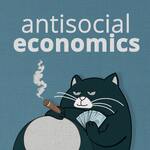Antisocial Economics
What is wealth? How come so many of us haven’t got any? How does wealth inequality make poverty worse? In the UK and other rich economies, wealth inequality and poverty are at incredibly high levels. A very small number of people are very rich and most other people are not. An increasing number of people live in poverty.
Should there be limits to the amount of wealth one person can own? How come so many wealthy people are so dependent on state handouts? Why is it so hard to do anything about it? While we know a lot about poverty, we know a lot less about wealth. Did you know that the UK Office for National Statistics only started tracking wealth and assets in 2006? And Thomas Piketty’s Capital in the 21st Century broke new ground with its historical wealth data in 2013. This is all remarkably recent.
Podcast host Sarah Kerr is a researcher who explores the links between wealth, poverty and power. In this first series of Antisocial Economics, Talking about Wealth, Sarah talks to academics and campaigners about:
The role of wealth in the widening sense of economic insecurity and electoral volatility - (with Professor Jane Green, University of Oxford. Which demographics are feeling the most financial distress and why might this matter for future elections?
What we mean by poverty and wealth and what the relationship is between them - (with Professor Mike Savage, (London School of Economics,) and Professor Jonathan Wolff, (University of Oxford). Is there something specific about wealth as form of economic resource that should change how we think about poverty?
The colonial history of wealth and its implications in the contemporary racial wealth divide, (with Professor Gurminder Bhambra, Sussex University). Who actually paid for the things we think of as ‘ours’ (like the NHS))?
Whether there should be limits on wealth (with Fernanda Balata (Political economist at New Economics Foundation) and Luke Hildyard (Director, High Pay Centre). Is there a point at which wealth causes social harm? What is ‘enough’?
The hidden world of tax expenditures - (with Professor Emeritus Adrian Sinfield, (University of Edinburgh). Why do we know so little about a huge government expenditure that benefits higher income earners the most?
Why is it so hard to do anything about it? (with Will Snell (CEO, Fairness Foundation), Dr Michael Vaughan (Research Fellow, LSE) and Dr Jonathan Mijs (Associate Professor, Boston University)). What is it about public attitudes and perceptions of the economy, of wealth, the wealthy and wealth inequality that makes change hard to achieve?
Antisocial Economics is an informed and accessible space for thinking and talking about wealth as a social problem, and specifically, for thinking about the effects of extreme private wealth ownership on social and environmental sustainability.
So why is the podcast called ‘Antisocial’ Economics’?
The economy isn’t working for most people, and wealth inequality is at the heart of the problem. We all work hard, but the wealth we create together is extracted to enrich a few men at the top. It feels unfair. And that’s because, frankly, it is!
This podcast is for anyone who wants to understand our social economy in a more critical way. Whether you are:
A student or researcher interested in inequality and social justice
A professional working in economics or public policy
Or a concerned citizen trying to make sense of rising inequality
Antisocial Economics is hosted by Sarah Kerr, a Research Fellow at the International Inequalities Institute. In 2024, Sarah published Wealth, Poverty and Enduring Inequality, Let’s Talk Wealtherty Starting from the premise that continuing to centre poverty encourages researchers and policymakers alike to 'look down’ she contributes to a strand of work that asks what happens if we 'look up’?
Copyright details · more info
Artwork and data is from the podcast’s open RSS feed; we link directly to audio · Read our DMCA procedureThis podcast may use tracking and attribution and dynamic content insertion
Stats: Statistics are produced by Megaphone and Podtrac to help Antisocial Economics to understand how many downloads it is getting, or how many people are listening. Your device’s IP address and user agent is used to help calculate this figure. Megaphone and Podtrac are IAB v2 certified. Here is more detail about podcast statistics.
Tracking and attribution: Megaphone or its partners may connect the fact you listened to this podcast to an action elsewhere on the internet. For example - it may spot a device that downloaded an episode of Antisocial Economics later visited the website of an advertiser; or it may track that a device that listened to Antisocial Economics also listened to a different show. This form of attribution is used to measure advertising effectiveness.
Dynamic content insertion: Megaphone may use limited data that they know about you - the device you’re using, the approximate location you’re in, or other data that can be derived from this, like the current weather forecast for your area - to change parts of the audio. Antisocial Economics may do this for advertising or for other forms of content, like news stories.
Antisocial Economics is able to use the above tools since its podcast host or measurement company offers this service. It doesn’t mean that this individual podcast uses them, or has access to this functionality. We use open data.
Listen and follow
Information for podcasters
- Podcast GUID:
c21460e7-b708-57ec-9276-a4709b59c990 - This podcast’s RSS feed does not link to any website. Valid homepage links are required by Apple Podcasts.
- This podcast appears to be missing from Luminary. We list all the podcast directories to be in.
- Validate this podcast’s RSS feed with Livewire, Truefans or CastFeedValidator

